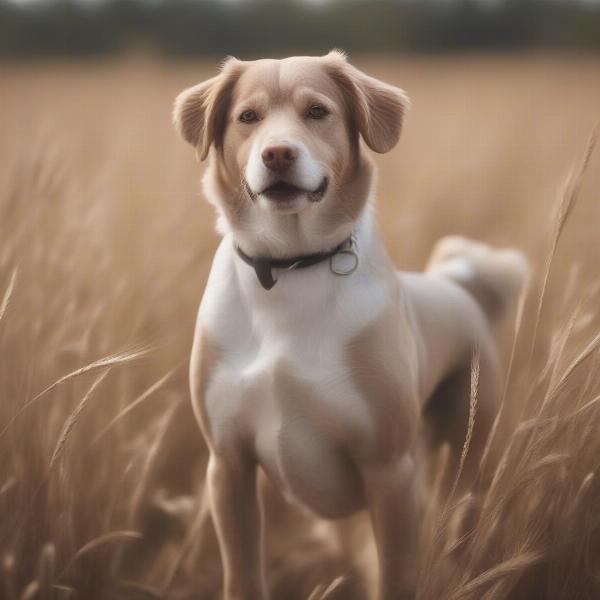Grain-free dry dog food has become increasingly popular in recent years. But is it the right choice for your canine companion? This comprehensive guide will explore the benefits and drawbacks of grain-free dry dog food, helping you make an informed decision about your dog’s nutritional needs. We’ll delve into the ingredients, potential health concerns, and how to choose the best grain-free kibble for your furry friend.
Choosing the right food for your dog can be overwhelming, especially with the vast array of options available. Grain-free diets have gained attention for their potential benefits, particularly for dogs with allergies or sensitivities. However, it’s crucial to understand the nuances of grain-free food and whether it truly aligns with your dog’s individual requirements.
Understanding Grain-Free Dog Food
What exactly does “grain-free” mean? Simply put, it means the food doesn’t contain grains like wheat, corn, rice, barley, or rye. These are often replaced with alternative carbohydrates like potatoes, sweet potatoes, peas, lentils, or tapioca. These alternative carbohydrates provide energy and fiber, similar to grains.
While some dogs genuinely benefit from a grain-free diet, it’s essential to remember that grains themselves aren’t inherently bad for dogs. Many dogs thrive on diets containing grains. It’s more about the quality of the ingredients and the overall nutritional balance of the food.
Benefits of Grain-Free Dry Dog Food
Some dogs experience allergies or sensitivities to certain grains. Switching to a grain-free diet can alleviate these issues, resulting in healthier skin, a shinier coat, and reduced digestive upset.
 Dog with Healthy Coat
Dog with Healthy Coat
Grain-free diets often have higher protein content, which can be beneficial for active dogs or those with specific dietary needs. This increased protein can help maintain muscle mass and provide sustained energy. Additionally, some dogs find grain-free kibble more palatable, leading to increased food intake.
Potential Concerns with Grain-Free Diets
While grain-free diets can be beneficial for some dogs, there have been some concerns raised regarding a potential link between grain-free diets and dilated cardiomyopathy (DCM), a heart condition. It’s crucial to discuss any dietary changes with your veterinarian, especially if your dog has any pre-existing health conditions.
Choosing a high-quality grain-free food from a reputable brand is paramount. Look for foods that meet the Association of American Feed Control Officials (AAFCO) nutritional standards.
Choosing the Right Grain-Free Dry Dog Food
With so many grain-free options available, how do you choose the best one for your dog? Consider your dog’s age, breed, activity level, and any specific health concerns. dry grain free dog food offers a variety of options to suit individual needs.
Look for foods with high-quality protein sources, such as meat or fish, as the primary ingredient. Avoid foods with artificial colors, flavors, or preservatives.
Is Grain-Free Right for Your Dog?
Ultimately, the decision of whether to feed your dog a grain-free diet is a personal one. Consult with your veterinarian to determine if a grain-free diet is appropriate for your dog’s individual needs. annamaet grain-free lean low fat formula dry dog food nearby might be a suitable option for dogs requiring a leaner diet. They can help you assess your dog’s health and make the best choice for their long-term well-being. billy and margot dog food review and jinx dog food reviews can provide insights into specific brands. Consider also honest kitchen dog treats as a healthy complement to your dog’s diet.
Conclusion
Grain-free dry dog food can be a beneficial option for some dogs, especially those with grain allergies or sensitivities. However, it’s essential to choose a high-quality food and consult with your veterinarian to ensure it aligns with your dog’s individual needs. A balanced diet, along with regular exercise and veterinary care, will contribute to a long, healthy, and happy life for your furry companion.
- What are the common ingredients in grain-free dog food? Grain-free dog food typically uses alternative carbohydrates like potatoes, sweet potatoes, peas, lentils, or tapioca.
- Is grain-free dog food better for all dogs? No, not all dogs require a grain-free diet. Many dogs thrive on diets containing grains.
- What are the potential risks of grain-free dog food? Some studies have suggested a potential link between grain-free diets and dilated cardiomyopathy (DCM) in dogs.
- How do I choose the best grain-free dog food for my dog? Consider your dog’s age, breed, activity level, and any specific health concerns. Consult with your veterinarian for personalized advice.
- Where can I find more information on grain-free dog food? Your veterinarian and reputable pet food manufacturers can provide additional information on grain-free dog food.
ILM Dog is your trusted international resource for all things dog-related. We provide expert advice on dog breeds, health, training, nutrition, grooming, and much more. Whether you’re a seasoned dog owner or just starting your journey, we’re here to help you navigate every aspect of dog care. For expert advice on choosing the best products for your canine companion, contact us via email at [email protected] or by phone at +44 20-3965-8624. ILM Dog is dedicated to helping you provide the best possible care for your beloved pet.